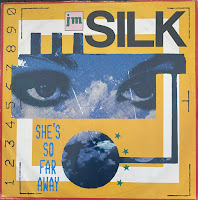"Dark, brooding, funky and utterly fabulous re-mix from her "Raw Like Sushi" LP in which Neneh smoulders through a tragic tale of inner city blues and "mamas"."
— Lola Borg
And so the eighties come to a close.
It's appropriate that the final Single of the Fortnight of the decade would be by an individual who had been one of the most arresting acts of the year and looked set to be the future of pop music in the nineties. The final issue of Smash Hits of '89 even featured a prominent photo of a smiling Neneh Cherry alongside pics of Jason Donovan, Bros, Soul II Soul's Jazzie B, New Kids on the Block and Axel Rose of Guns 'N Roses. It's a round-up of the past year but clearly these were people to keep an eye on for the next twelve months — and, indeed, well into the future. Suffice it to say the nineties didn't belong to any of them.
Neneh Cherry's four British singles from Raw Like Sushi all represented something different. "Buffalo Stance" grabbed people's attention, "Manchild" convinced any remaining doubters as to her artistic cred, "Kisses on the Wind" proved she could do late-eighties' pop with the best of 'em and, finally, "Inna City Mama" was meant to to place her in a much more serious context.
Being in North America, however, this narrative didn't apply. "Manchild" had been just a deep cut on the other side of the Atlantic as it got passed over in favour of the more radio-friendly "Kisses" and "Inna City Mama" was similarly ignored, this time to the so-so "Heart", another pop number that didn't do much. She may have still been the future of pop in Europe but her standing across the water was already in decline.
The title is a clear nod to "Inner City Blues (Make Me Wanna Holler)", the outstanding closing track from Marvin Gaye's influential 1971 album What's Going On. The version on Raw Like Sushi opens with the same "New York, just like I pictured it..." bit from Stevie Wonder's "Living for the City" from his equally important album Innervisions. This suggests she'd been exploring vintage Motown at the time but any further influence isn't apparent. Rather than aping a pair of soul music legends, perhaps she was simply trying to place herself in the same rarefied air.
Remixes as a justification for a fourth, fifth and even sixth single from an album was becoming all-too common at around this time. Often the changes made would be subtle, a gentle sprucing up of the sound in order to stem the tide of the law of decreasing returns. I'm sure there's some of that spirit here but this is far more than your standard producer adding and/or removing samples or putting greater emphasis on the bass part. For one thing, Cherry seems to have given her vocal a complete redo. Her aggressive reading on the album version is replaced with a more restrained performance on the single. There's also less of the pretense of trying to do something hardcore. The verses and chorus are fairly laid back and it is only at the rap in the bridge where she shows some intensity. (The remix does a poor job transitioning from the two parts which is its only big drawback compared to the album version)
The remix/re-record of "Inna City Mama" proved to be mostly effective but it failed to stem the downward trajectory of her singles and it only managed to limp into the lower reaches of the Top 40 (and this was during the annual January chart lull). Cherry would return to the hit parade later in 1990 with a strong cover of the Cole Porter classic "I've Got You Under My Skin" from the Red Hot + Blue charity album. She would continue to enjoy success but she would never again be the figure she had been for much of 1989. Nineties wouldn't end up belonging to Neneh Cherry but I'm sure she was fine with not achieving what she never set out to accomplish.
~~~~~
Also of some cop
Electronic: "Getting Away with It"
Lola Borg mentions the blight of seventies' rock 'n' roll supergroups and draws a direct line to this mash-up of New Order, Pet Shop Boys and The Smiths that was Electronic. I'd like to say she's wrong to be disappointed but I can't. Yes, it does sound like a "mardy New Order LP track" and it doesn't approach the best work of Johnny Marr, Bernard Sumner and Neil Tennant. It does, however, point to New Order's eventual pop direction nearly four years later as well as the Pet Shops' gradual acceptance of the guitar as an instrument to not necessarily avoid like the plague in their recordings. Again, they'd put them to better use in their day jobs in the future (as opposed to Marr who no longer had a permanent band to fall back on). To their credit though, they soldiered on and subsequent singles "Get the Message" and "Disappointed" proved to be a lot better. Still less than the sum of their parts but worthy nonetheless.









